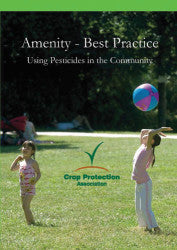CPA launch two explanatory Pesticide Booklets
 The Crop Protection Association (CPA) have produced two booklets aimed at demonstrating the benefits of pesticides to the community.
The Crop Protection Association (CPA) have produced two booklets aimed at demonstrating the benefits of pesticides to the community.
'Amenity Best Practice' looks at pesticide use in the community, safety and legislation and explains why pesticides are used. It features comment from Eddie Seaward, Head Groundsman at the All England Lawn Tennis Club, and Gordon Moir, Director of Greenkeeping at St. Andrews.
"An introduction to plant protection products" explains the huge benefits these products offer. It explains how products are brought to the market and the stringent self regulation within the industry. It also details how the quality and supply of our food would be seriously affected, and how much extra land would be required if plant protection products were to disappear.
Both booklets are designed to educate the public on the benefits of pesticide usage.
Richard Minton, of the CPA's Amenity Group, said "Everyone is a beneficiary in one way or another, whether playing sport on well presented and maintained sports pitches, walking on weed free pavements or travelling on the road and rail infrastructure. If we are to maintain the quality standards we currently enjoy, adopting 'Best Practice' remains the number one priority for all those involved in the application of pesticides."
"This means using pesticides as part of an Integrated Pest Management programme, ensuring all legal requirements are met and minimising risk to human health and the environment is achieved."
"Over recent years we have seen many products withdrawn from the amenity market - we cannot afford to lose any more. Failure to meet the targets set by the Sustainable Use Directive or the standards laid down in the Water Framework Directive could lead to further product withdrawals, restricted use or even a total pesticide ban. This would prove catastrophic to the road and rail infrastructure of this country and devastating to all the sports played on natural surfaces.
The result would be: pavements and rail lines covered in, and damaged by, weeds; football pitches, golf courses, cricket grounds all covered with weeds, pests and diseases. Alternative methods of control are not as effective and, invariably, a lot more expensive."
"The amenity industry has a duty of care to ensure the safe use of pesticides for the long term future; it can no longer bury its head in the sand and think this threat from Europe will go away. The standards have been written, the targets have been set, and everyone using pesticides must meet and achieve them."
Both booklets are available in PDF format from www.cropprotecion.org.uk
